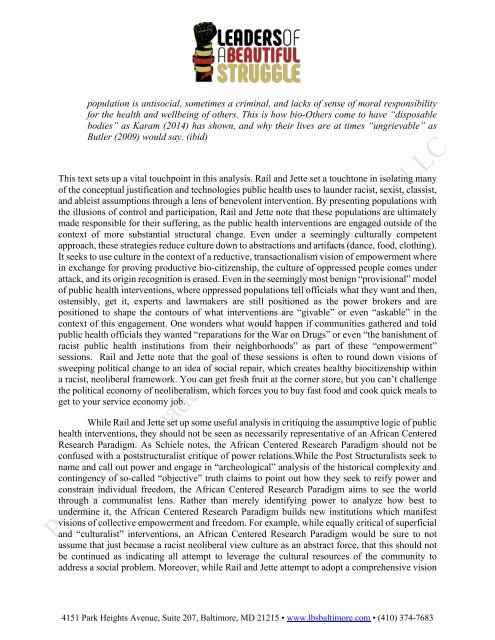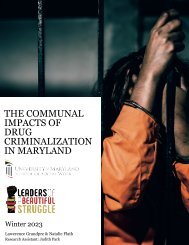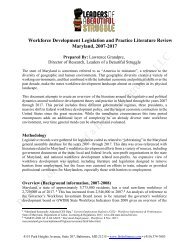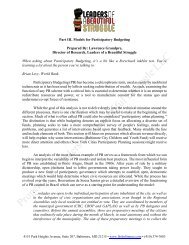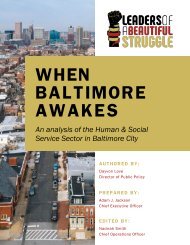Drug Decriminalization in Maryland Through an African Centered Research Paradigm- Analysis and Recommendations
This document offers guidance for theorizing questions related to a proposed research project purposed to advance drug decriminalization in Maryland.
This document offers guidance for theorizing questions related to a proposed research project purposed to advance drug decriminalization in Maryland.
- No tags were found...
You also want an ePaper? Increase the reach of your titles
YUMPU automatically turns print PDFs into web optimized ePapers that Google loves.
population is <strong>an</strong>tisocial, sometimes a crim<strong>in</strong>al, <strong>an</strong>d lacks of sense of moral responsibility<br />
for the health <strong>an</strong>d wellbe<strong>in</strong>g of others. This is how bio-Others come to have “disposable<br />
bodies” as Karam (2014) has shown, <strong>an</strong>d why their lives are at times “ungrievable” as<br />
Butler (2009) would say. (ibid)<br />
This text sets up a vital touchpo<strong>in</strong>t <strong>in</strong> this <strong>an</strong>alysis. Rail <strong>an</strong>d Jette set a touchtone <strong>in</strong> isolat<strong>in</strong>g m<strong>an</strong>y<br />
of the conceptual justification <strong>an</strong>d technologies public health uses to launder racist, sexist, classist,<br />
<strong>an</strong>d ableist assumptions through a lens of benevolent <strong>in</strong>tervention. By present<strong>in</strong>g populations with<br />
the illusions of control <strong>an</strong>d participation, Rail <strong>an</strong>d Jette note that these populations are ultimately<br />
made responsible for their suffer<strong>in</strong>g, as the public health <strong>in</strong>terventions are engaged outside of the<br />
context of more subst<strong>an</strong>tial structural ch<strong>an</strong>ge. Even under a seem<strong>in</strong>gly culturally competent<br />
approach, these strategies reduce culture down to abstractions <strong>an</strong>d artifacts (d<strong>an</strong>ce, food, cloth<strong>in</strong>g).<br />
It seeks to use culture <strong>in</strong> the context of a reductive, tr<strong>an</strong>sactionalism vision of empowerment where<br />
<strong>in</strong> exch<strong>an</strong>ge for prov<strong>in</strong>g productive bio-citizenship, the culture of oppressed people comes under<br />
attack, <strong>an</strong>d its orig<strong>in</strong> recognition is erased. Even <strong>in</strong> the seem<strong>in</strong>gly most benign “provisional” model<br />
of public health <strong>in</strong>terventions, where oppressed populations tell officials what they w<strong>an</strong>t <strong>an</strong>d then,<br />
ostensibly, get it, experts <strong>an</strong>d lawmakers are still positioned as the power brokers <strong>an</strong>d are<br />
positioned to shape the contours of what <strong>in</strong>terventions are “givable” or even “askable” <strong>in</strong> the<br />
context of this engagement. One wonders what would happen if communities gathered <strong>an</strong>d told<br />
public health officials they w<strong>an</strong>ted “reparations for the War on <strong>Drug</strong>s” or even “the b<strong>an</strong>ishment of<br />
racist public health <strong>in</strong>stitutions from their neighborhoods” as part of these “empowerment”<br />
sessions. Rail <strong>an</strong>d Jette note that the goal of these sessions is often to round down visions of<br />
sweep<strong>in</strong>g political ch<strong>an</strong>ge to <strong>an</strong> idea of social repair, which creates healthy biocitizenship with<strong>in</strong><br />
a racist, neoliberal framework. You c<strong>an</strong> get fresh fruit at the corner store, but you c<strong>an</strong>’t challenge<br />
the political economy of neoliberalism, which forces you to buy fast food <strong>an</strong>d cook quick meals to<br />
get to your service economy job.<br />
While Rail <strong>an</strong>d Jette set up some useful <strong>an</strong>alysis <strong>in</strong> critiqu<strong>in</strong>g the assumptive logic of public<br />
health <strong>in</strong>terventions, they should not be seen as necessarily representative of <strong>an</strong> Afric<strong>an</strong> <strong>Centered</strong><br />
<strong>Research</strong> <strong>Paradigm</strong>. As Schiele notes, the Afric<strong>an</strong> <strong>Centered</strong> <strong>Research</strong> <strong>Paradigm</strong> should not be<br />
confused with a poststructuralist critique of power relations.While the Post Structuralists seek to<br />
name <strong>an</strong>d call out power <strong>an</strong>d engage <strong>in</strong> “archeological” <strong>an</strong>alysis of the historical complexity <strong>an</strong>d<br />
cont<strong>in</strong>gency of so-called “objective” truth claims to po<strong>in</strong>t out how they seek to reify power <strong>an</strong>d<br />
constra<strong>in</strong> <strong>in</strong>dividual freedom, the Afric<strong>an</strong> <strong>Centered</strong> <strong>Research</strong> <strong>Paradigm</strong> aims to see the world<br />
through a communalist lens. Rather th<strong>an</strong> merely identify<strong>in</strong>g power to <strong>an</strong>alyze how best to<br />
underm<strong>in</strong>e it, the Afric<strong>an</strong> <strong>Centered</strong> <strong>Research</strong> <strong>Paradigm</strong> builds new <strong>in</strong>stitutions which m<strong>an</strong>ifest<br />
visions of collective empowerment <strong>an</strong>d freedom. For example, while equally critical of superficial<br />
<strong>an</strong>d “culturalist” <strong>in</strong>terventions, <strong>an</strong> Afric<strong>an</strong> <strong>Centered</strong> <strong>Research</strong> <strong>Paradigm</strong> would be sure to not<br />
assume that just because a racist neoliberal view culture as <strong>an</strong> abstract force, that this should not<br />
be cont<strong>in</strong>ued as <strong>in</strong>dicat<strong>in</strong>g all attempt to leverage the cultural resources of the community to<br />
address a social problem. Moreover, while Rail <strong>an</strong>d Jette attempt to adopt a comprehensive vision<br />
4151 Park Heights Avenue, Suite 207, Baltimore, MD 21215 • www.lbsbaltimore.com • (410) 374-7683


